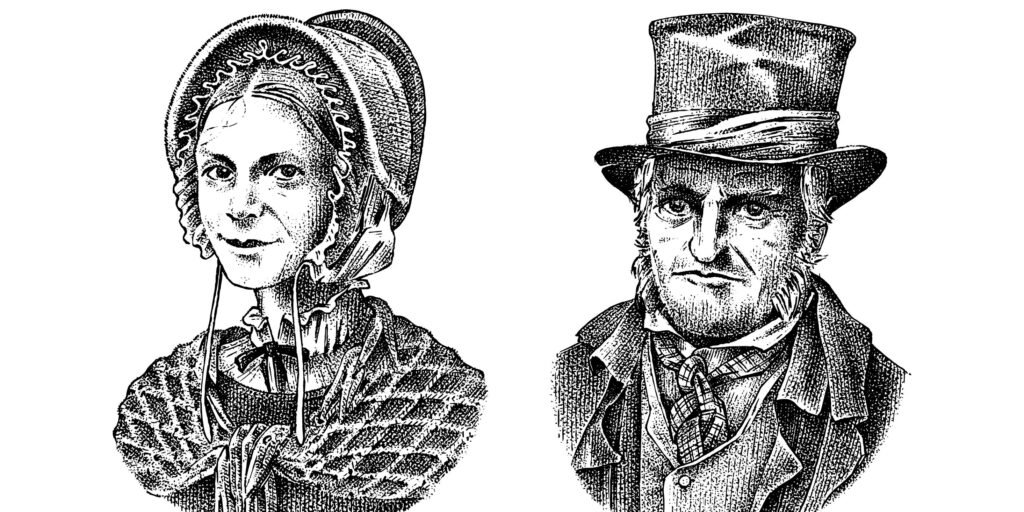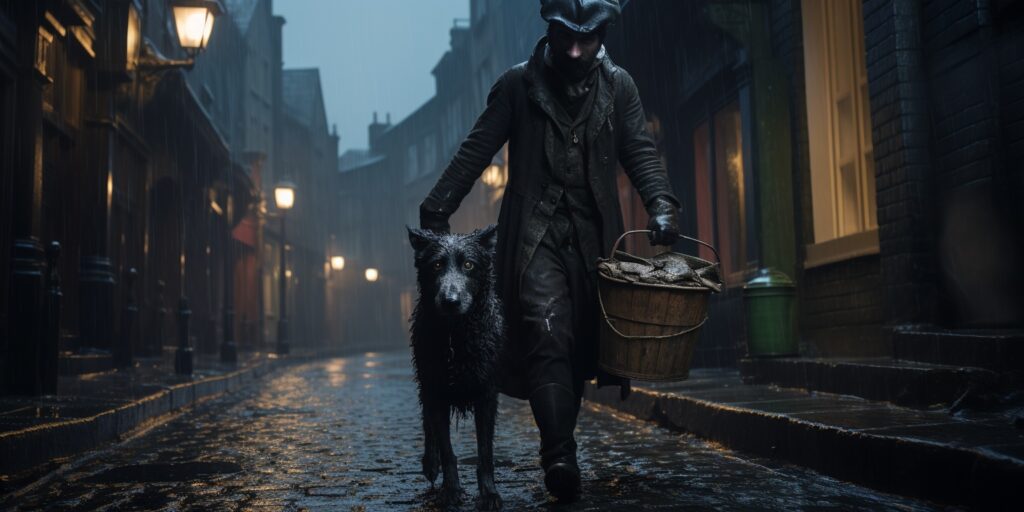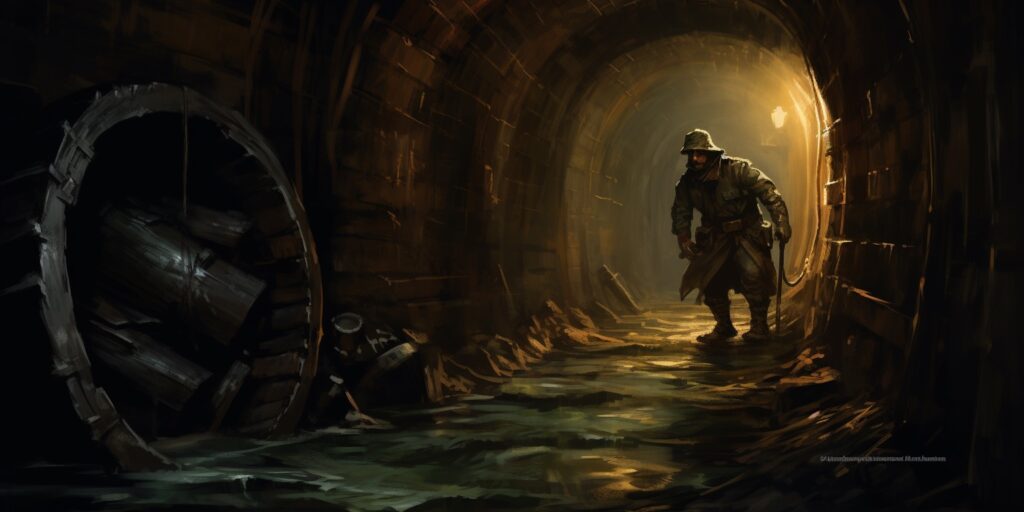Take a peak into the strangest jobs of Victorian London, where a world without fixed employment created the Bone Grubber, the Sewer Hunter and the Pure Finder – who collected dog faeces.

Where there’s muck, there’s money. It’s a British expression popularised in the Victorian era when the industrial revolution caused rapid growth in urban populations but startling contrast in their fortunes. One man, Henry Mayhew, took a unique interest in how those at the bottom of the pile survived, including those who found fascinating ways to monetise London’s growing detritus, introducing us to the strangest jobs of Victorian London.
The work of Henry Mayhew
Mayhew was a Victorian journalist who, for a decade from 1840, recorded in minute detail the lives of what he described as London’s street folk and how they scratched a living.
His observations were originally serialised in London’s Morning Chronicle and then collected into three enormous volumes under the title of London Labour and London Poor.
His work can be considered early citizen journalism, shining a light on the hidden lives of the thousands of undocumented Londoners, often of no fixed abode.
the Government returns never have given us, and probably never will give us, any correct information respecting [street-folk].
London Labour and London Poor, by Henry Mayhew
What Mayhew gifted to those willing to trawl through his meticulous and rather pedantic records is a treasure trove of the most unbelievable and unsavoury ways Londoners found to make a living.
Mayhew was a social scientist who loved to categorise, so most of the strange Victorian-era jobs he observed were described by a collective noun. So let’s meet the strangest of the sellers, finders, hunters, and scavengers of 19th-century London.
The Pure Finder – Collector of dog poo
In volume two of his great work London Labour and London Poor, Mayhew wrote that in the mid-1800s, there were 200-300 people making a living collecting dog excrement and selling it to the tanning industry.
You may struggle to decide which was worse. Picking up the dog mess with your bare hands, which most did as it saved washing a glove or rubbing it into leather to purify it?
This act of leather purification, aided by the alkalinity of the dog mess, explains the origin of the name, Pure Finder and the nickname given to dog faeces, Pure.

As repulsive as the job of a Pure Finder sounds, they could earn such a decent living that competition became intense for the best territories.
The canniest Pure Finders struck a direct relationship with dog kennels as well as exclusive partnerships with the 30 or-so tanning yards, most of which were located in Bermondsey.
- Read our separate article explaining what a Victorian Pure Finder was.
The Flushermen – Loosening deposits
In wake of the cholera epidemics, it became compulsory in 1847 for London’s sewers to be flushed, with an inspector reporting on their condition. To help with this unsavoury task were gangs of Flushermen deep in the detritus with shovels and rakes, loosening the deposits discarded down the drains and toilets before water was flushed through to wash the debris away.
Aside from the danger of being swept away by the powerful torrents of human waste, Flushermen had to contend with the overpowering smell and ever-present rats.
Though generally, the smell was putrid, sometimes it was intoxicating with the Flushermen made ‘innocent drunks‘ from the steam that escaped into the sewers from distillers, brewers and pubs.
The stories of the rats encountered are epic – ‘some are as big as good-sized kittens’. In the early days of the Flushermen, it was reported that cart-loads of drowned rats were carried into the Thames.
Such were the swarms of rats that Flushermen generally worked in groups of 3-5, careful not to corner the vermin as they were known to ‘fly at ’em‘ if left no other option.
One time Whitechapel High Street was almost choked with butcher’s offal and we had a great deal of trouble with it.
A Flusherman giving an account of his experience in flushing, 1848
Sometimes a Flusherman might find something valuable among the muck, like a coin, though most were what were known as smashers – counterfeit coins tossed away for being worthless.
The Sewer Hunters & Mudlarks
Before the laws changed regarding flushing sewers, the bowels of Victorian London were accessible to anyone brave enough to venture down there. Those that scavenged the drains in search of valuables were known as Sewer Hunters.
These hardy treasure hunters were equipped for the specific dangers of their enterprise, carrying a seven-foot hoe to gauge the depth of mud, heave them out if they got stuck in the quagmire or rake through its upper layers, hoping to find rope, scrap metal or bones.
Sewer hunters were known by various names, such as shore hunter or shore man, because much of their time was also spent scavenging the muddy shores of the Thames around the bustling dockyards, looking for anything of value lost or tossed from ship or pier.
Sometimes Sewer Hunters were described as Toshers, tosh being slang for copper, which was commonly used in ship-building but today used as a derogatory ‘a load of old tosh‘ meaning to talk nonsense.

Though it may sound like you can’t get much lower than Sewer Hunting, it was actually at the top of a pecking order for scavengers, above Mudlarks.
Today Londoners pay good money to go Mudlarking – scavenging the Thames’ foreshore under the guidance of a licensed Mudlarker – but back in Victorian London, it was a dangerous pursuit for only the desperate.
Mudlarkers tended to be children who stuck to the muddy foreshore looking for coal, bones or scrap metal, literally anything of value. Mudlarking children often worked barefoot, even in winter, and would regularly suffer injury from rusty nails or pieces of glass piercing their feet.
Read separate articles explaining what a Sewer Hunter was and the story of the most famous Sewer Hunter who found a secret way into the Bank of England.
The Bone Grubber – As bad as it sounds
Without knowing what the life of a Bone Grubber involved, you can be certain the term, as coined by Henry Mayhew, didn’t describe anything pleasant.
The term was a catch-all for street folk who wandered about collecting anything of value. Bone Grubbers would have no fixed abode, living in cheap lodging houses or ‘straw yards‘ which are exactly as they sound, the last refuge for somewhere to shelter during Winter.
Bone Grubbers were often people who’d fallen from more secure employment by misfortune with no other means of support.
Mayhew estimated that there were up to 1,000 Grubbers, but their numbers would swell once the harvest season was over with ‘trampers’ descending on London, literally tramping in from the countryside. The Irish famine also contributed significant numbers to the ranks of Bone Grubbers.
Bone Grubbers carried a sack and spiked stick useful for scouring through refuse down back alleys looking primarily for bones and rags but happily collecting anything of value, such as waste metal to sell to the rag and bottle shop.
Bone Grubbers generally worked their own territories, getting up early to be first to whatever had been thrown out the previous evening.
‘[Bone Grubbers] rise at two in the morning and sometimes earlier….from seven to nine hours to cover his rounds…he travels from 20 to 30 miles with a quarter to half hundredweight on his back”.
London Labour and the London Poor, Volume 2
At the end of that long day, everything a Bone Grubber had collected would be sorted into parcels – rags by colour – and taken to be sold at the Rag Shop, Marine Dealer or Rag and Bone men, hoping to raise enough to survive another day.
The term Rag and Bone Man (not the rapper) is still in use in London today, but in Mayhew’s time referred to someone who bought and sold rags, bones and household items from a barrow or cart.
Rag and Bone Men were several levels above Bone Grubbers in the hierarchy of street folk.
The serious side of Mayhew’s work
Though the gruesome detail Henry Mahew provided about Victorian London’s street folk is fascinating, there was a serious side to his amazing body of work.
Mayhew gave a voice to a whole section of London’s society who were largely invisible. He conducted hours of interviews in a distinctive narrative style that, by removing his questions, allowed each character a chance to talk directly to the reader about their situation.
Mayhew didn’t have the answers to why so many street folk lived hand-to-mouth, but he showed empathy for their situation and was prepared to take up their cause as an expert before parliamentary committees.
In some cases, Mayhew directly intervened to help, such as with a young Mudark boy and part-time who he became convinced was simply a victim of circumstance. He gave him two shillings which supported his family for a month and eventually found him a job at a printers where he flourished.
This simple story requires no comments, and is narrated here in the hope that it may teach many to know how often the poor boys reared in the gutter are thieves, merely because society forbids them being honest lads.
The experiences of a juvenile Mudlark, London Labour & the London Poor, Volume 2
Mayhew’s style of human categorisation and moral judgement would get him immediately cancelled today, but Mayhew’s views must be judged within the context of prevailing attitudes of the Victorian era.
Though London’s urban environment has improved over the last century, significant numbers of people still struggle to survive because of a continued absence of social infrastructure.
While in many cities of the developing world, the situation is still on a par with Victorian London, with the poor forced to try and earn a living from what others discard.
This website aims to illustrate the idea that there is no such thing as a free lunch because if there were magical ways to make money, Sewer Hunters and Pure Finders would never have existed.
Faced with nothing but what Londoners threw away or their pets expelled, these Victorian street folk found a way to make a living, and for that, they should be admired.
No Free Lunch
There is no such thing as a free lunch, but if you’re hungry to find out why, we’re here to help.
You can learn the meaning and origin of the no free lunch concept, as well as the broader philosophy behind the idea that nothing can ever be regarded as free.
We look at our relationship with money and truth, examining all of the supposed shortcuts, life hacks and get-rich-quick schemes.
